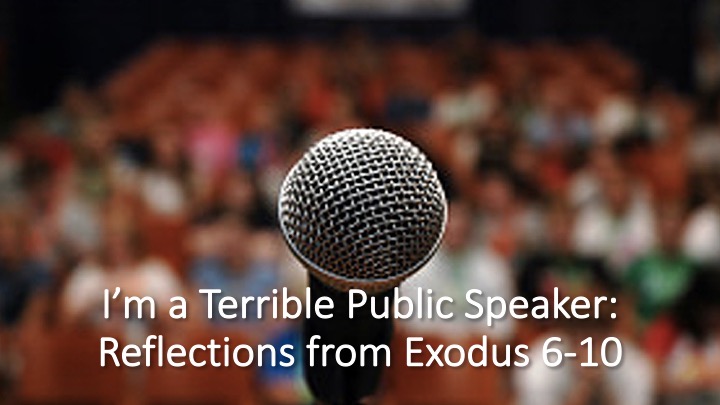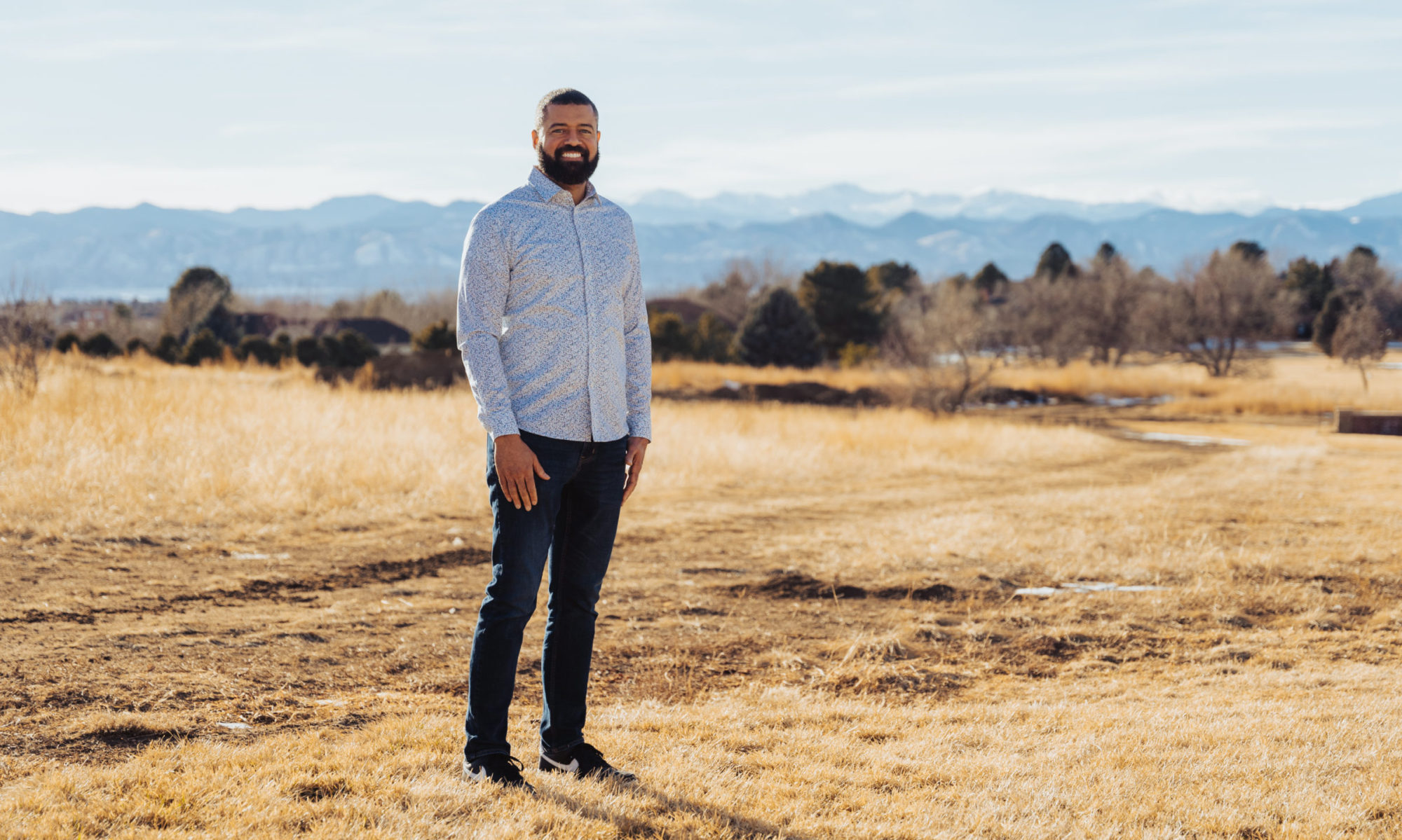
Read Exodus 6-10
At First Glance
I had forgotten that Aaron appears to be more than just supporting cast in the plagues narrative. God provided Moses with Aaron because of Moses’ many excuses/fears, including “I’m a terrible public speaker,” and “Who would listen to me?” This last concern is validated for Moses when he tells the Israelites of the Lord’s promise to free them. They were not able to receive that message with faith and joy because of the increasing hardship of forced labor due to Moses’ intervention with Pharaoh. “If I can’t get my own people to listen to me why do you expect that Pharaoh would?” Moses is short sighted and all he can see is his weaknesses and fears and not God’s immanence and strength. This is a God versus Pharaoh wrestling match. Moses is God’s tag team partner and Pharaoh does not hold the belt. Even with his army he is outnumbered and outmatched.
God has the championship belt and Moses has a staff that turns into a snake, but I think that may be fear #6. “I’m afraid of snakes too.” I’m not sure of all of Moses’ fears just like I am not quite sure of all the fears I own. I wonder if Moses has a fear of, “what’s next?” It’s a fear that says, “What if they (the Israelites and Pharaoh) actually choose to listen to me?” “What if I actually get what I ask for?” “Then what?”
Aaron steps in and plays a major role. He isn’t afraid of snakes! He throws down his staff in front of Pharaoh and his minions and it becomes a snake just like God promised. Sometimes God’s instructions appear to be given directly to Moses so that he can pass it on to Aaron and at other times they are together receiving the next “mission impossible.” Yet for the first several encounters it is Aaron that stretches out his staff.
God is the coach of this miracle team. Moses plays the part of the offensive coordinator and Aaron is the quarterback. Moses is Lane Kiffin and God is Nick Saban – minus the intense sideline butt chewin’. I think God is more gracious and believe or not (UA fans), probably gets better results. “In [God] we trust.” “[God’s]” team. Roll Tide.
Pharaoh’s magicians are no miracle workers and they reach down in their bag of tricks only to find it empty when they try and duplicate the gnats plague. I’ve lived in south Alabama. Gnats are annoying. I would have thrown in the towel. This is the “finger of God” or better yet, God’s arm bar, and it’s tightening. This is where you tap out Pharaoh before your arm gets broke, or worse.
I noticed a change in the way the boils plague is administered. Moses gets tactile and tosses handfuls of soot into the air a la Lebron James. Later Moses is stretching out his hand to bring darkness that can be felt over the entire land of Egypt. A little foreshadowing? This will not be Egypt’s darkest day.
Which slaves were left in the field during the hailstorm? Were the Israelites killed because of the Egyptians negligence?
God definitely has a purpose for hardening Pharaoh’s already hardened heart. He says clearly, more than once that it is so this story would have longevity. One plague? That’s too easy to dismiss and forget. Ten plagues?! Seems excessive. Yet we are still reading about the exodus thousands of years later. We will never forget. The only reason we remember Pharaoh is because he was forever stubborn.
After the plague of darkness is this really the last time the Moses and Pharaoh speak? I don’t think so.
A Deeper Look
Both Fretheim and Enns talk about the Israelite’s disbelief to Moses sharing the good news of God’s promise of deliverance. Fretheim says that, “Their negative response to Moses reveals a “broken spirit. …the ability to hear the word of God can be adversely affected by the conditions in which people live” (pp. 89). He also points out that Moses makes no further attempts to speak to the people until the night before they are to be released. Enns considers it an irony that in the end the Egyptians recognize that God’s honor is to be vindicated while Israel is slow to understand what God has done (Kindle Loc 3531).
I remember listening to a fellow college student many years ago preach a sermon on the stubbornness of Israel. He bemoaned their slowness to get what was really going on. How could they not be excited about what Moses told them? Post exodus, why do they complain so and desire to return back to Egypt? Why do they make the golden calf? What he said next represents a common mindset in how modern day readers view the Israelites and how much of a disconnect there is in their own behavior and the Hebrew slaves. He proceeded to tell the congregation during his sermon, “I just don’t get how they didn’t understand? Maybe if I were there things would be different.”
It was laughable, extremely misguided and arrogant. It took me a while to figure why that statement felt so wrong. Fretheim and Enns remind me to practice empathy and sympathize with the early people of God. They had been enslaved for so long and now their oppression intensified with each step Moses took toward their liberation. How could I possible think that I would respond any differently than the Israelites or Moses?
Moses is discouraged but both commentators agree that Moses was probably called twice by God. To which Enns believes that God is making himself more fully known in the second commissioning of Moses (Kindle Loc 3428). Both authors also believe that God’s heart is for the whole world, in the plague cycle we discover, using Fretheims words, “God’s activity on behalf of Israel is for the sake of the world (p. 95)!”
Exodus for Today
My own circumstances and environmental challenges can make it difficult for me to see what God has promised through His son Jesus. I can be as stubborn as Moses, the Israelites, and Pharaoh.
The Western church can be just as afraid and full of excuses as Moses. We are called similar to Moses. God may not have called us to a burning bush, given us a staff and a leprous hand as signs.
He has given us a better Moses and a better exodus in Jesus Christ. In Jesus we have been given his Holy Spirit and the great commission. We bare the image of God. Like Moses we may be called to it more than once.
The Western church can be just as stubborn as Pharaoh. We can be guilty of displaying a lack of empathy for those who are oppressed. We can spend more time arguing over the medium used for peaceful protests than the subject of the protest.
So, have as much patience for others as you have for yourself, empathize with the broken spirited, broken hearted and oppressed.
Deliverance is a path and not simply a destination. Walk the path with someone esle in someone elses’ shoes. As you walk together you will find that deliverance isn’t just for you. God’s delieverance is for the nations.
Jovan preaches for the Littleton Church of Christ near Denver, Colorado. Visit here to listen to sermons preached by Jovan.
